Lei Jufang,The Spiritual Billionaire
“I am a born idealist. Medical culture is a magical world that can benefit others.” ~ Lei Jufang
With
no makeup and her graying hair combed into a plait behind her,
58-year-old Lei, who is often seen, dressed in a plain black shirt,
looks like a middle-aged woman shopping for vegetables in a market. Yet
she is anything but an average housewife. This self-made billionaire
runs Tibet Cheezheng Tibetan Medicine, which makes ointments, plasters
and powders designed to relieve pain and respiratory problems. Products
from her company are seen in most pharmaceutical stores in China, and
its users range from ordinary folks to Olympic athletes.
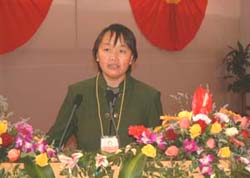 Lei
was admitted to Jiaotung University in Xian, Shaanxi Province, in 19.
She graduated and worked in a science academy in Lanzhou, capital of
Gansu. As an assistant professor, she worked out a way to use a vacuum
seal to preserve materials such. She was rewarded with fame and money,
and a possible promotion within the organization she worked for.
Lei
was admitted to Jiaotung University in Xian, Shaanxi Province, in 19.
She graduated and worked in a science academy in Lanzhou, capital of
Gansu. As an assistant professor, she worked out a way to use a vacuum
seal to preserve materials such. She was rewarded with fame and money,
and a possible promotion within the organization she worked for.But one thing kept puzzling her: What is the meaning of all the hard work if many scientific results remain in the laboratory?
However, under China’s program of encouraging scientists to commercialize their studies in the laboratory, she set up an industrial pollution control institute in Lanzhou in 1987, which eventually developed into a company earning revenues of millions of Yuan per year. But just when the company started to make enormous profit, Lei was forced to resign from her job in the company because of differences with her colleagues over management.
The setback plunged her into depression and Lei quit the rat race. It seemed there always was a dilemma in her life. The failure of doing business also made her wonder about the true meaning of life. “I started to ask some basic questions, “she added. “For instance, “What is true in life?”
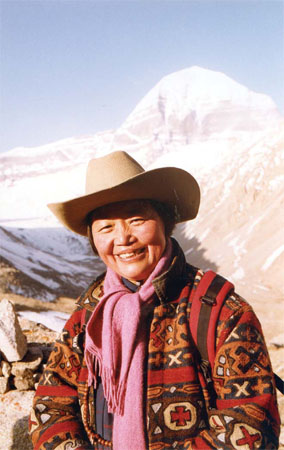 The
questions drove her to a soul-searching journey to Tibet, a place that
she had always wanted to see. There she found the power of religion
remains strong and began to learn more about Tibetan Buddhism.
The
questions drove her to a soul-searching journey to Tibet, a place that
she had always wanted to see. There she found the power of religion
remains strong and began to learn more about Tibetan Buddhism.
Lei went back to Tibet several times afterward. Learning from lessons
of her first business experience, she thought that maybe a good way to
do business was to create something that people are seeking for their
own good, not others. “People will buy medicine that is good for
themselves, but not for others,” says Lei. And she also remembers that
when she visited a Buddhist temple in Tibet, she saw a picture on the
wall with a drawing of the structure of human body. The structure was as
precise as any modern medical school, but it dated back to as many as
200 years ago.
It then dawned on her that Tibetan medicine, combined with modern
technology could have huge market potential. The lesson that she learned
from these journeys made the medicine business an obvious choice for
her, when she considered the next step after the failure of her first
attempt. She developed a pain-relieving plaster with Tibetan drugs and
her background in vacuum seal preservation allowed her to invent a
packaging machine herself rather than trying to buy one for millions of
Yuan from another country.
The second problem was how to promote her new product. Lei adopted a
grassroots, word-of-mouth approach and sent her staff with free
Cheezheng medicine to introduce to their friends and other people,
mainly athletes. She recalls that, they sent out medicine worth tens of
thousands of Yuan, a huge cost for a startup company.
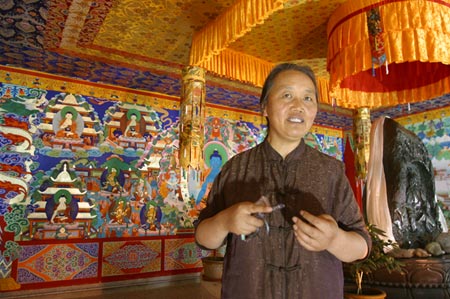 But
the immediate loss paid off with quick fame. Her product proved to be
highly effective in promoting blood circulation and relieving muscle
pain after being tested on players of the Bayi Rockets basketball team,
which trained in Lanzhou that year. Praise from Olympic athletes who
used the medicine to treat injuries drew interest. The media came and
Lei and her company were soon in the limelight.
But
the immediate loss paid off with quick fame. Her product proved to be
highly effective in promoting blood circulation and relieving muscle
pain after being tested on players of the Bayi Rockets basketball team,
which trained in Lanzhou that year. Praise from Olympic athletes who
used the medicine to treat injuries drew interest. The media came and
Lei and her company were soon in the limelight.
Today, she employs over 1,000 people, and 98 percent of them are
local Tibetans. She says sometimes she has doubts about whether her
Buddhist belief is contrary to pursuing profits.
“I was told that as long as your motivation is good and you put your
money to good use, it is fine,” she says. As a result, she is investing a
large portion of her money to local Tibetan education, to encourage
young Tibetan children to become doctors.
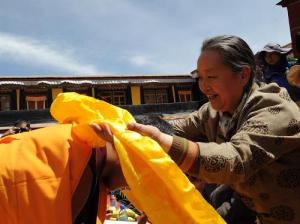 “According
to Tibetan medical theory, doctor and medicine can never be apart from
one another,” she says. In fact, there are fewer practitioners of
Tibetan medicine now. With an aim to make her business sustainable, Lei
has also planted a 3,000-meter-high herb plantation of Tibetan herbs for
future production.
“According
to Tibetan medical theory, doctor and medicine can never be apart from
one another,” she says. In fact, there are fewer practitioners of
Tibetan medicine now. With an aim to make her business sustainable, Lei
has also planted a 3,000-meter-high herb plantation of Tibetan herbs for
future production.
Born and brought up in poverty-driven Gansu province in northwestern
China, Lei says the memory of poverty has never really left her. She
always makes sure that the plate in front of her is empty after a meal,
and suggests that others do the same. For her, waste is like committing a
crime.
Lei says her biggest enjoyment is found in worshipping at Tibetan
Buddhist temples. She also plans to work less in a year or so and turn
over the management of her company to the young people around her.
“I will have more time to worship after I retire,” she says.
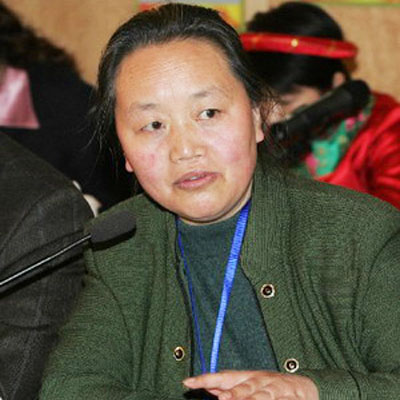
No comments:
Post a Comment